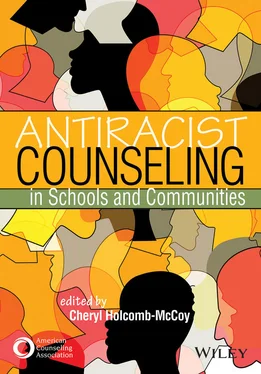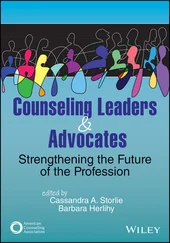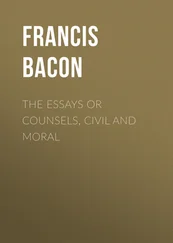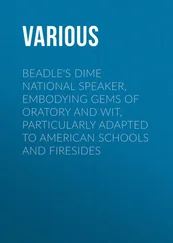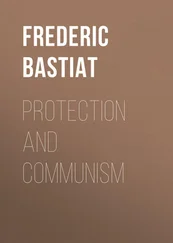Naomi understands that developing a political critical standpoint represents ongoing professional development and does not end with incorporating racial content and frameworks into her courses. It requires that she apply the critical standpoint into her various spheres of influence (e.g., her counseling program; colleagues; and service to her department, college, university, and the counseling profession) and needs to be valued as much as publication and scholarship. Naomi struggles with holding her counselor education program accountable for inadequately preparing their counseling graduates to work with racially/ethnically diverse students/clients while at the same time being collegial and not appearing confrontational. Unfortunately, taking a political critical standpoint has subjected Naomi to hypervisibility (e.g., being overly criticized, policed, targeted for retaliation) by colleagues and students who feel threatened by a challenge to the status quo. Naomi’s political critical standpoint is often perceived as aggressive, anachronistic, or too political or described condescendingly by her colleagues with adjectives like “interesting,” a word not typically associated with objective or rigorous perspectives or methodological approaches. Navigating her counseling program and university as a consciously critical Black woman comes with uncertainties that manifest as Naomi’s constant internal and external struggles. These struggles become an additional burden she must traverse when doing the ongoing self-work necessary to honor what it means to be antiracist.
Counselor educators must challenge the traditional counseling canon to create the more inclusive, representative, and equitable curriculum that students deserve— one that stimulates students to doubt, challenge, and reject preconceived notions of objective knowledge claims derived from Western episteme. The following strategies can be used to help counselors develop a political critical standpoint:
1 Acknowledge that the counseling profession is neither sociopolitically neutral nor immune to the influence of Western racial ideologies that support a racist status quo.
2 Acknowledge that your own knowledge is (to a certain degree) situated in dominant perspectives and social and political experiences that shape how you see and understand the world and determine which behaviors, values, worldviews, paradigms, sets of beliefs, and practices of others are considered healthy, credible, and relevant.
3 Familiarize yourself with components of counseling theories that (a) consider the social determinants of mental health and need to modify environmental conditions conducive to pathology; (b) question the capacity of the present social system to enhance the well-being of Blacks, Indigenous people, and people of color; and (c) critique socially structured inequalities and their psychological effects (Prilleltensky, 1994).
4 Use critical race theory as an interpretive lens to analyze and critique the Western hegemony embedded within the counseling canon, such as (a) whiteness as normative and nonracial; (b) the silence of marginalized narratives; (c) liberal principles of neutrality, fairness, and meritocracy; (d) color blindness; and (e) the inextricability of race, power, and privilege (e.g., Crenshaw et al., 1995).
5 Seek insights from Black feminism and Black feminist epistemologies/counseling practices to (a) develop a critical lens and language with which to scrutinize the ideological repercussions of psychology, (b) examine previously ignored issues, (c) formulate and test new (and old) hypotheses, and (d) develop alternative theoretical paradigms that are sensitive to the realities and contextualized lives of oppressed groups (e.g., Thomas, 2004).
6 Plan for and engage in racial justice action that goes beyond merely developing a political critical standpoint.
1 American Counseling Association. (2020, June 22). ACA anti-racism statement. https://www.counseling.org/news/updates/news-detail/2020/06/22/aca-anti-racism-statement
2 American School Counselor Association. (2014). Mindsets and behaviors for student success: K-12 college- and career-readiness standards for every student.
3 American School Counselor Association. (2020, November 10). Member demographics. https://www.schoolcounselor.org/getmedia/9c1d81ab-2484-4615-9dd7-d788a241beaf/member-demographics.pdf
4 Ani, M. (1994). Yurugu: An African-centered critique of European cultural thought and behavior. Africa World Press.
5 Arredondo, P., D’Andrea, M., & Lee, C. (2020, September 10). Unmasking white supremacy and racism in the counseling profession. Counseling Today. https://ct.counseling.org/2020/09/unmasking-white-supremacy-and-racism-in-the-counseling-profession/
6 Au, W. (2016). Meritocracy 2.0: High-stakes, standardized testing as a racial project of neoliberal multiculturalism. Educational Policy, 30(1), 39–62.
7 Baldwin, J. (1962, January 14). As much truth as one can bear. The New York Times, T11.
8 Bell, D. (2002). Ethical ambition: Living a life of meaning and worth. Bloomsbury.
9 Bulhan, H. A. (1990, November). Afro-centric psychology: Perspectives and practice [Opening address]. UWC conference Psychology and Apartheid.
10 Castro-Gómez, S., & Martin, D. A. (2002). The social sciences, epistemic violence, and the problem of the “invention of the other.” Nepantla, 3(2), 269–285.
Clarke, J. H. (1998). Christopher Columbus and the Afrikan holocaust: Slavery and the rise of European capitalism . A&B.
1 Crenshaw, K., Gotanda, N., Peller, G., & Thomas, K. (Eds.). (1995). Critical race theory: The key writings that formed the movement. The New Press.
2 Cushman, P. (1996). Constructing the self, constructing America: A cultural history of psychotherapy. Da Capo Press.
3 Du Bois, W. E. B. (2015). The souls of Black folk. Yale University Press. (Original work published 1903).
4 Duckworth, A. L., Peterson, C., Matthews, M. D., & Kelly, D. R. (2007). Grit: Perseverance and passion for long-term goals. Journal of Personality and Social Psychology, 92(6), 1087–1101. https://doi.org/10.1037/0022-3514.92.6.1087
5 Fanon, F. (1963). The wretched of the earth. Grove Press.
6 Fanon, F. (2008). Black skin, white masks. Grove Press.
7 Freire, P. (1972). Pedagogy of the oppressed. Penguin Books.
8 Goodman, R. D., Williams, J. M., Chung, R. C. Y., Talleyrand, R. M., Douglass, A. M., McMahon, H. G., & Bemak, F. (2015). Decolonizing traditional pedagogies and practices in counseling and psychology education: A move towards social justice and action. In R. D. Goodman & P. C. Gorski (Eds.), Decolonizing “multicultural” counseling through social justice (pp. 147–164). Springer.
9 Grier, W. H. (2004). Foreword. In R. V. Guthrie, Even the rat was white: A historical view of psychology (pp. xi–xii). Pearson Education.
10 Griffin, C. B., Gray, D., Hope, E., Metzger, I.W., & Henderson, D. X. (2020). Do coping responses and racial identity promote school adjustment among Black youth? Applying an equity-elaborated social–emotional learning lens. Urban Education. Advance online publication. https://doi.org/10.1177/0042085920933346
11 Guthrie, R. (1970). Even the rat was white. Harper & Row.
12 Guthrie, R. V. (2004). Even the rat was white: A historical view of psychology. Pearson Education.
13 Hansen, J. T. (2006). Counseling theories within a postmodernist epistemology: New roles for theories in counseling practice. Journal of Counseling & Development, 84(3), 291–297. https://doi.org/10.1002/j.1556-6678.2006.tb00408.x
14 Henfield, M. S., Washington, A. R., Rue, L. D. L., & Byrd, J. A. (2017). Black male school counselor educator contextual explorations in leadership. Professional School Counseling, 21(1b), 1–10. https://doi.org/10.1177/2156759X18773591
Читать дальше
